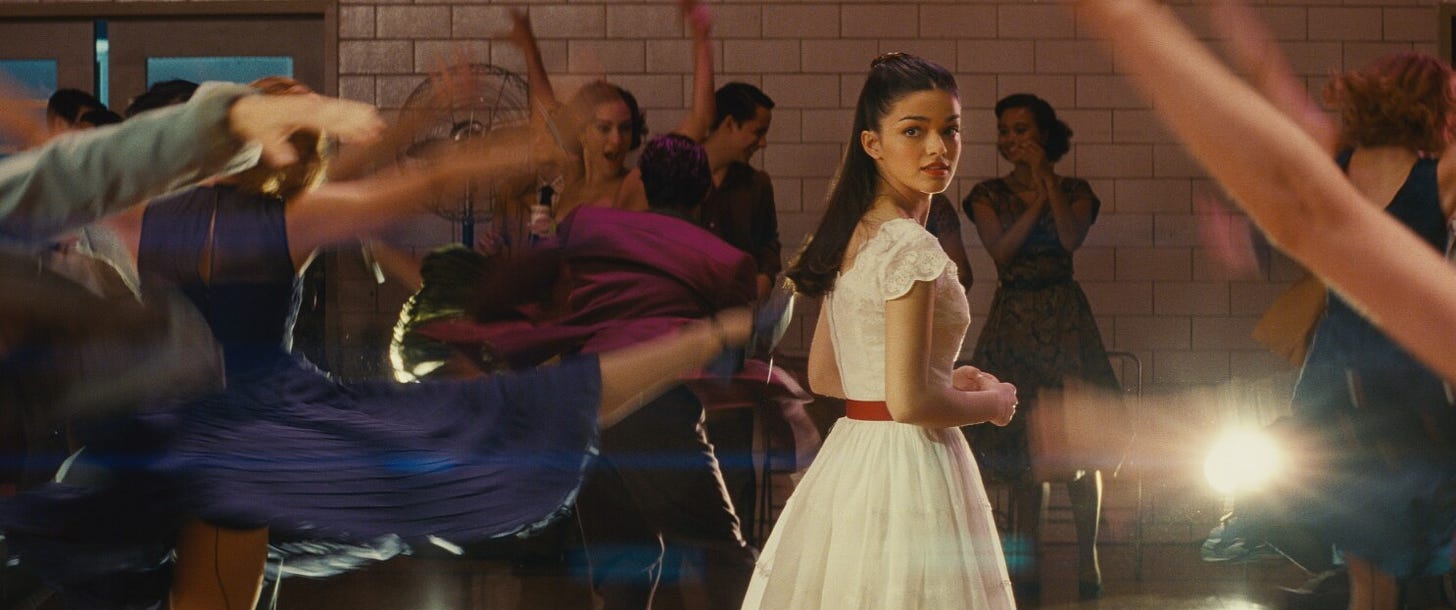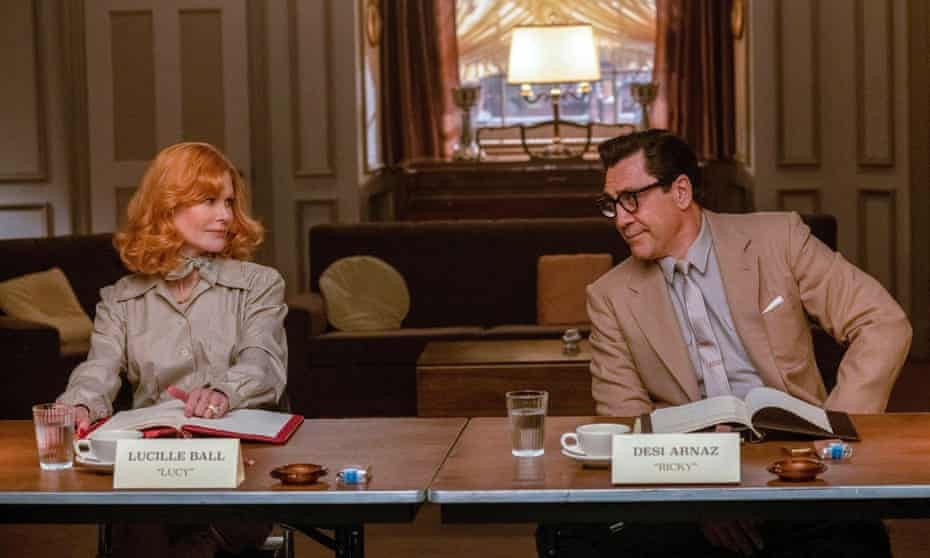In Review: 'Red Rocket,' 'West Side Story,' 'Being the Ricardos'
Sean Baker follows up 'The Florida Project' with a raucous dark comedy about a "suitcase pimp," Steven Spielberg and Tony Kushner revive a Broadway classic, and Aaron Sorkin dips into TV history.
Red Rocket
Dir. Sean Baker
128 min.
In porn circles, the term “suitcase pimp” refers to a remarkably narrow species of human, an unemployed man who serves as a kind of agent and assistant to his porn-star girlfriend, accompanying her to sets and managing her affairs. For these guys, the trick, as with a regular pimp, is to make a parasitic relationship seem like a protective one, which requires a sinister charisma on the man’s part—a sharp perfume to cover up the stench of a bottom-feeding loser. It’s hard to think of them as con artists per se, because we credit con artists with being clever, but suitcase pimps do have the gift of gab. They know how to be persuasive in the room.
In Red Rocket, Sean Baker’s uproariously unhinged slice of Americana, former adult performer and MTV VJ Simon Rex plays just such a species of human, Mikey Saber, a dopey rapscallion who’s been scamming people long enough to understand his powers. Mikey understands, for example, that there’s no chance that his estranged wife Lexi (Bree Elrod) will welcome an out-of-the-blue phone call from him, much less let him move into the home she shares with her mother Lil (Brenda Deiss) in Texas City, Texas. But he does know that if he takes a two-day bus ride from Los Angeles to this godforsaken Gulf Coast town he left many years ago, he can get a literal foot in the door. If his usual snake-oil salesmanship doesn’t work on them, he will simply exhaust them into submission.
The key to Red Rocket is that he does the same to us, which is a credit to Rex’s goofy relentlessness and to Baker and co-writer Chris Bergoch’s own track record for depicting lovable outsiders in films like 2012’s Starlet, 2015’s Tangerine, and 2017’s The Florida Project. Baker welcomes the uneasy relationship the audience is likely to have to Mikey, who we might recognize as a malignant narcissist, especially as the film unfolds, but who presents himself as an infectious trickster, like an adults-only Bugs Bunny. There are fascinating political resonances to Baker and Bergoch’s decision to set the action in the lead-up to the 2016 election, among them Mikey’s Trump-like talent for winning approval from people who know that he’s a charlatan.
After working his way into Lexi’s home—first for a quick shower, then for a night or two on the couch, then semi-permanently—Mikey goes out looking for a job so he can fulfill the modest promise of contributing $200/month in rent money. The 17-year gap in his résumé proves to be a problem for potential employers, however, and when he finally explains his history as an award-winning adult film actor, he only becomes that much more unemployable, as if sex work has made him unsanitary. And so, to raise the money, he makes a successful bid to return to an old gig as a weed dealer, which better suits his gifts as a salesman anyway.
But Mikey is too restless and impulsive a spirit to stay on the relative straight-and-narrow, so it’s inevitable that he’ll get into trouble. That trouble comes in the form of Strawberry (Suzanna Son), a flirtatious 17-year-old redhead who finds Mikey more exciting than her job as a donut shop cashier. At first, Mikey seems to see Strawberry as another sexual conquest, someone new to slake an endless thirst, but he starts to develop ideas that would take them both out of Texas City. He’s grooming her, but in such a way that he rationalizes it as entrepreneurship and she rationalizes it as a path to liberated adulthood.
The engineering of this plan is invisible, almost to the point where even Mikey seems late to see the strings that he’s pulling. Red Rocket has a seat-of-the-pants spontaneity that’s thrillingly unpredictable and frequently hilarious—it is the rare dark comedy where the darkness slips slowly and insidiously through the comic pleasures. Mikey is a Category-5 hurricane of destructive charm, and the people of Texas City are slow to batten down the hatches, even those who have been devastated by his maelstrom of bullshit in the past. That’s the Trump phenomenon again, this strange willingness to get ripped off by a TV con man, because at least he’s not deploying the alien language of Clintonian hope-speak.
Baker makes films about the invisible and the underclass, but not with the stifling earnestness that dogs the rare indies that venture too far outside the city. Through his lens, Texas City lives up to its archetypal name, embodying the many small towns buckling from a permanently ravaged economy, pockmarked by chains and dollar stores, and residential streets lined with dilapidated homes and unkempt expanses of lawn. But Red Rocket is funnier and nervier than his previous work, trusting us to sort out our feelings for Mikey without hand-holding or fingerpointing. Cued to the two-decade-old NSYNC song “Bye Bye Bye,” which it samples to varied and inspired effect, the film probes Mikey’s suspended adolescence and discovers a middle-aged guy who can’t change his tune. — Scott Tobias
Red Rocket opens in limited release on Friday.
West Side Story
Dir. Steven Spielberg
156 min.
Why West Side Story now?
Theater companies and high schools across the country are exempt from the question, since stage revivals of Arthur Laurents’ Broadway hit—with its booming Leonard Bernstein music, its deftly funny and romantic Stephen Sondheim lyrics, and its dynamic Jerome Robbins choreography—have been ongoing since it debuted in 1957. But there didn’t seem to be any promising answers to justify a studio remake of the Oscar-winning 1961 screen musical, especially one that’s content to revisit the original’s period in New York City history. It’s been easy not to expect too much. Would director Steven Spielberg and his screenwriter, the esteemed Tony Kushner, reflect the risk aversion of contemporary Hollywood and give us minor tweaks on something we’ve seen before? Or would they lard it up with facile allusions to 21st century urban crises?
What Spielberg and Kushner have done instead, with a team of first-rate collaborators and a mostly stellar cast, is thread the thinnest of needles, offering throwback classicism while actively yet subtly interrogating with the text. And not just any text, but a flawed text, one that could never be perfect in fusing the Verona of Shakespeare’s Romeo and Juliet with the dance-fighting of Manhattan’s evolving slums. It’s an ideal piece of creative choreography in itself: Kushner the curator and revisionist, sharpening up the history and ethnic tensions of the times while going to work on long-standing flaws in characterization, and Spielberg the filmmaking savant, finally setting his cameras loose on a movie musical. They’re playing a game on the margins of the ’61 version, and in nearly every regard winning.
The only real loss is the casting of Ansel Elgort as Tony, co-founder of the white gang, The Jets, but now a well-meaning drip whose recent prison stint has him rethinking his dedication to gang violence. Still, Elgort’s gawky mediocrity, which diminished other mostly good movies like Baby Driver and The Fault in Our Stars, isn’t so great a distance removed from Richard Beymer’s miscasting in the same role in 1961, and his Maria is a marked improvement on Natalie Wood. YouTube star and casting-call discovery Rachel Zegler doesn’t just pass the low bar of seeming more like the sister of a Puerto Rican gang leader than Wood, Her physical slightness, combined with a soaring voice, has the effect of underscoring the fragility of this star-crossed relationship. She carries enough emotion for the both of them.
On Kushner’s end of things, the bulldozing it took to create the new Lincoln Center arts complex in 1957 leaves the Jets, led by Tony’s best buddy Riff (a nimble Mike Faist), and the Sharks, led by Maria’s brother Bernardo (David Alvarez), fighting for turf that’s disappearing under the feet. We catch the faintest dash of modern-day white grievance from these Jets, though their hostility and delinquency are treated more mournfully, like a generation of lost boys. But Kushner does particularly strong work on the Sharks, who have worked hard to assimilate to a country that isn’t living up to its promises. The extra time spent with Maria, Bernardo, and his zesty girlfriend Anita (a superb Ariana DeBose), all of whom speak in a Spanish that needn’t be translated to be understood, makes this retelling feel more balanced and democratic than the ’61 version. And Chino (Josh Andrés Rivera) is no longer a dim square paired with Maria, but an ambitious and full-bodied striver of his own.
As for Spielberg, he marshals some powerful forces behind the camera: Longtime photographer Janusz Kaminski, who busts out the full assortment to diffusion filters and key lights; production designer Adam Stockhausen, who creates backdrops that feel simultaneously true to Broadway and to real New York; and choreographer Justin Peck, who expands on or reinvents dance sequences rather than try to mimic or top Jerome Robbins. (Moving “America” from a rooftop at night to the neighborhood during the day has a particularly vibrant impact.) Lesser numbers that usually slow the production down, like “Cool” or “Officer Krupke” have been revivified with purpose and wit.
More broadly, Spielberg simply shows the kids how it’s done. Despite occasional lumbering attempts to bring Broadway to Hollywood, the movie musical remains a lost art, subject to music-video hashwork or unwieldy re-creations of stage choreography. Spielberg knows how to make the camera an active partner to the song-and-dance numbers, and there’s such a satisfying fluidity to West Side Story that it can feel, as a viewer, like re-discovering some long-atrophied muscle. If the film were merely an exercise in craft and craft alone, it would have been worth making. — Scott Tobias
West Side Story opens in theaters nationwide on Friday.
Being the Ricardos
Dir. Aaron Sorkin
131 min.
Did you know that one reason CBS wanted to create the TV show that eventually became I Love Lucy was because Lucille Ball delivered such a physical performance while recording episodes of the radio show My Favorite Husband? Or that Desi Arnaz’s father was the mayor of Santiago, Cuba? Or that co-star William Frawley honed his chops in vaudeville? Well, Aaron Sorkin does, and packs all that information and more into Being the Ricardos, a dramatization of one eventful week in the life of Lucille Ball and husband/co-star/producing partner Desi Arnaz that doubles as a kind of I Love Lucy origin story. It’s filled with familiar Sorkinisms—the snappy dialogue, the fractious team that pulls it together when it counts, the combination of walking and talking—but doesn’t seem to have any reason to exist beyond delivering a lot of info about one of the defining shows of TV’s golden age. It’s like a Wikipedia entry with one-liners.
Ball (Nicole Kidman) and Arnaz (Javier Bardem), we’re told early on by one of the (fictionalized) talking head interviews that frame the movie, were either “tearing each others’ heads off or tearing each others’ clothes off.” An opening scene, complete with the line “Lucy, I’m home!,” depicts both these tendencies, but that’s the deepest insight the film has to offer into their relationship. Kidman and Bardem do their best to get beyond mere impersonation, but both performances get stuck in a kind of twilight zone between fully crafted characters and simulations of iconic stars. Of the two, Kidman has more to work with, particularly in scenes that depict Ball tirelessly refining and reworking gags for maximum comedic effect, at one point summoning Frawley (J.K. Simmons) and Vivian Vance (Nina Arianda) in the middle of the night to get the blocking of a scene just right. Such moments capture some of the difficulty Ball must have faced as a woman seeking creative control, but they would be more effective if Sorkin didn’t turn her into one of his typical heroes: a hyperverbal workaholic who’s frustrating as hell but somehow always right, dammit. You gotta give it to her!
The film finds Ball facing more challenges than ever as, in the days leading up to a Friday show, tabloids report on Arnaz’s infidelities, other news outlets sniff around her possible past involvement with the Communist Party, and network reps and sponsors balk at incorporating her pregnancy into the show. It’s dramatic stuff but so drearily dramatized and drudgingly paced it can’t be saved by flashes of Sorkin wit or the best efforts of a talented cast. The Arnaz/Ball story intersects with mid-century racism, sexism, the influence of television and tabloid media, and anti-communist paranoia, all of which the film talks about but its engagement never gets much further than talk. You’ll learn some fun facts watching it however. There’s no denying that. —Keith Phipps
Being the Ricardos opens in theaters nationwide on Friday before premiering on Prime Video on December 21st.











Wasn't expecting to suddenly feel the need to see West Side Story, but now I do!
Having seen "Tangerine" and "The Florida Project," I can't wait to see "Red Rocket." I'm also cringing in anticipation of whatever it is the title references.